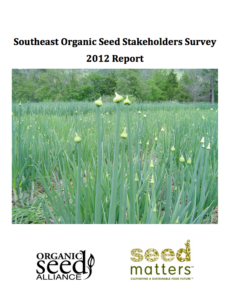
OSA has released findings from an organic seed survey conducted in the Southeast region of the U.S. Findings point to enormous interest among farmers and other agricultural professionals in strengthening seed systems in the Southeast to address the needs of the organic community. The short report can be downloaded here. This project is made possible by funding from the Seed Matters initiative.
Working with regional partners, OSA developed an online survey to assess organic seed systems in the Southeast and identify collaborative opportunities to expand and improve these systems. The survey, which closed last month, collected responses from more than 2,200 individuals, including nearly 500 farmers. The following findings are drawn from these farmer responses:
Southeast farmers rely on saving seed. Nearly half of respondents report saving seed for on-farm use.
Southeast farmers seek seed advice from neighbors. More than 75% of farmers report turning to other farmers for seed-related questions.
Southeast farmers see challenges for the organic seed sector. Half of respondents view the lack of organic seed, as well as the lack of variety information, as urgent or very important. Seventy-five percent of respondents see contamination by genetically modified organisms (GMOs) as an urgent or very important challenge to organic seed in the Southeast.
Southeast farmers want to strengthen the organic seed system in their region. The majority of respondents believe that public education on organic seed is urgent or very important (80%) and view research on which varieties perform best for organic farms in the Southeast as urgent or very important (80%). Most respondents also believe that teaching farmers to save seed is urgent or very important (70%). Lastly, the majority of respondents believe it is urgent or very important to safeguard organic seed systems in the Southeast from GMOs (90%).
“Strengthening organic seed systems at the regional level demands a deep understanding of the opportunities within the community involved, and a comprehensive approach to addressing their needs,” says Jared Zystro of Organic Seed Alliance. “We know through past experience that such an approach involves building public-private partnerships, fostering participatory plant breeding projects, and bolstering seed skills at the farm level.”
Based on the overwhelming response to the survey and the amount of interest in organic seed systems in the Southeast, a project committee made up of farm organizations, universities, and farmers is planning upcoming work in this region. Contact Jared Zystro at jared@seedalliance.org if you live in the Southeast and want to get involved.
